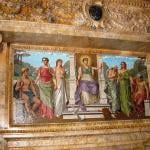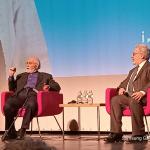
Christianity teaches us something special about God, something which a few pre-Christian philosophers (such as Platonists) perceived in an imperfect manner (that is, they had a glimmer of the truth, allowing them to develop philosophical insights which Christians would later explore and develop in their theological exploration), and that is, God is Triune. There are three divine persons, and each of them desires to have a relationship with us:
The entire world at its interior is filled with the self-communicating Trinty. God is willing the universe with His loving Self. His uncreated energies whirl through and fill all creatures with His loving, creative presence: “He spoke, and it was created; he commanded and there it stood” (Ps 33:9).[1]
God, the source and foundation of the truth, is both one and three; the divinity is one, but the divinity is realized in a community of three persons, a community which does not undermine but actually upholds the unity and oneness of God. The absolute truth which comes from (and can be said to be) God is one. We must not confuse such oneness in a simplistic monistic sense, taking the truth as a monad, which happens when the Trinity is denied. Rather, the truth is found in and with love; it is established and exists in and through divine love, a love which requires a relative plurality in the divinity for it to be true. Why? Because love requires a lover and a beloved. For God to be love, that love needs to be eternal, which means, there would have to be an eternal sharing of that love, which only happens if there is more than one person involved with the divine nature. This is why, when it is revealed what our hearts already know, that God is love, we realize something about the nature of the truth itself, that is, the truth can only be known and experienced through the lens of love. If this is true, then, truth is not something which is obtained individually, but through a community, and not just any kind of community, but a community which embraces love as the foundation for its existence.
Christianity also teaches us that we are made in the image and likeness of God. When we learn that God is triune, God is a community, we should come to conclude one way we are to represent the image of God in us is to do so by imitating the love the persons of the Trinity have for each other by likewise loving each other. That we, through our mutual love, we will form the kind of bonds needed for us to be united and become one, reflecting the unity or oneness of God. The more we love, the more we engage others in love, the more we imagine God, and the more we imagine God, the greater we will become. It is only in and through such greatness will we begin to truly apprehend the ultimate truth; the greater we become, through our love, the more of the truth we will apprehend, allowing us to have a greater understanding and awareness of the majesty of the truth itself.
This is far from the way many of us consider the way truth is to be acquired; we think it is something we can and should obtain all by ourselves, and in doing so, glorify ourselves; but this is false, as Piet Fransen said: “We have become increasingly aware that truth can be acquired only by the efforts of the whole community. To think that we can find truth in solitude is an illusion.” [2] Each of us have unique contributions which we can and should contribute to the human community; the more we share, the greater the community becomes, even as the greater the community becomes, the more we can properly develop ourselves and our unique gifts. Every one of us, to be sure, apprehends elements of the truth by ourselves, and it is for this reason, many think the acquisition of the truth is an individualistic enterprise; however, what we attain relies upon what we have learned from others, and what we learn can and should be shared with others so that it can be used by them so that they can take what we have learned, develop it, and lead us to some new insight, an insight which can only come about when we come together in such a fashion. “The same holds for the discovery of truth. We must work together, each according to his own talents, capacities, responsibilities, and mission. It is an immense responsibility, and we can accomplish it only in accord with freedom’s own truth.”[3]
This is one of many reasons why it is foolish to try to live life alone, to be an island unto ourselves, thinking we can and will be able to do all things all by ourselves. Much of what we have comes to us from others. We rely upon their goodwill in relation to the way of life we live. We must, therefore, use what we have been given, use it to improve ourselves, yes, but also to give back to those who have given much to us. We owe them, we owe society, for what we have been given. If we take without giving back, we end up consuming and destroying the world around us instead of making it better. Sadly, we tend to be selfish, ignoring our responsibility to the community, undermining the love we should have, and as a result, not only do we end up destroying what we should be building up, our ability to engage the truth is likewise affected, so that we end up apprehending far less than we should, and interpreting in a way which ultimately has us further diverted from the truth itself. For we follow an individualistic mindset, thinking we can and should do all things all by ourselves, rising or falling all on our own; so many of us, following such lack of love, end up seeking to replace what we lose with a desire to dominate and control the world, creating an artificial unity which replaces the one we should find ourselves in. Despot after despot, tyrant after tyrant, murderer after murderer rises up in the world as a result of this mentality. They represent the end result of such individualism, of the ego when it reinforces itself by resisting the reality of our interdependent existence.
We should learn the lesson of history, seeing this is the case, but do we do so? Sadly, we don’t; instead, we often take such individualism for granted and bring it into the spiritual realm. In the end, we end up following the example of Satan, who sought to lord it over everyone and fell as a result, instead of Christ, who desired to serve everyone with love, and so was glorified as a result. We will find, how much we think we can and will make things better for ourselves, and so save ourselves, such an individualistic spirituality will only end with a continuation or repetition of the fall:
But dominance has not saved us. And reason has been grossly unreasonable. Individualism made us cripplers of human community and has left us crippled ourselves, lost in a morass of solitary biases.[4]
When we do not learn how to form a community of love, to properly reflect the divine in us by realizing our personal nature, and through it, the interdependence we have with each other, we end up cutting up the world into more and more parts, atomizing the world. This sometimes gives us the sense that find more and more things to manipulate and control, but we lose sight of all that we have lost. We find ourselves never attaining the spiritual peace and joy which we desire. Instead of thinking that proves we must change our ways, we often think what we must do is obtain more and more control over various parts of the world, until we find the element which we need to be satisfied. No matter how much we try, we will never find that piece. All we end up doing is denying more and more of the world, more and more of the unity which exists in the world (and in humanity as well), and so, we end up denying the true way to find our true happiness. And. if we are not careful, we end up denying the truth, because we do not find the truth in all the parts which we have made. This is what has happened in our present age, a time which is called a post-truth world, because the truth itself has been denied by the way it has been cut up and destroyed. For how can we know truth when we have denied the basis in which it is to be found, which is the community which comes together out of love?
[1] George Maloney, SJ, God’s Exploding Love (New York: Alba House. 1987), 23.
[2] Piet F. Fransen SJ, “Man and Freedom” in Man Before God: Toward A Theology of Man. Ed. Dennis Burkhard OFM, Leo A. Connolly, William T. Merten, and Michael G. Steinhauser (New York: P.J. Kenedy & Sons, 1966), 72.
[3] Piet F. Fransen SJ, “Man and Freedom,” 82.
[4] Joan Chittister, The Friendship of Women (New York: BlueBridge, 2006), 86.
Stay in touch! Like A Little Bit of Nothing on Facebook.
If you liked what you read, please consider sharing it with your friends and family!
N.B.: While I read comments to moderate them, I rarely respond to them. If I don’t respond to your comment directly, don’t assume I am unthankful for it. I appreciate it. But I want readers to feel free to ask questions, and hopefully, dialogue with each other. I have shared what I wanted to say, though some responses will get a brief reply by me, or, if I find it interesting and something I can engage fully, as the foundation for another post. I have had many posts inspired or improved upon thanks to my readers.













